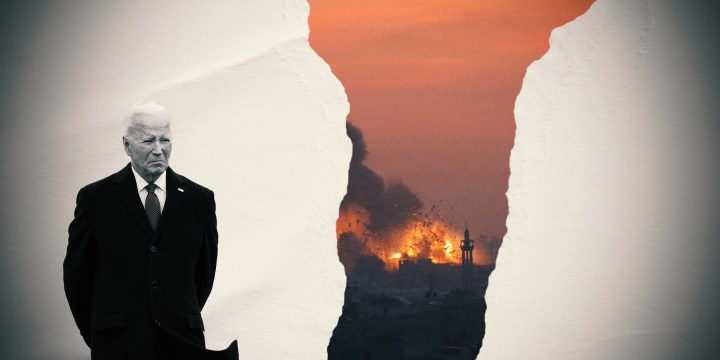MIDDLE EAST CRISIS ANALYSIS
Biden needs a big, bold doctrine to unravel his geopolitical Gordian knot

Even as the violence and conflict on several Middle Eastern fronts continue, the Biden administration appears to be bent on forging a new, more comprehensive way out of the morass. Will it succeed?
Nearly 2½ millenniums ago, the Macedonian empire builder Alexander the Great, on his path to glory, led his army into the city of Gordium, the capital of the Phrygian kingdom of Anatolia. Before Alexander’s visit, Gordium was already famous as the reputed home of the legendary King Midas.
The story goes that at the gates of Gordium, the young conquerer encountered an ancient wagon whose yoke was tied, as a Roman historian described it hundreds of years later, with “several knots all so tightly entangled that it was impossible to see how they were fastened”. Meanwhile, an oracle had prophesied that the man who unravelled this impossibly tangled knot would become the ruler of all of Asia.
According to Arrian, yet another ancient historian, Alexander was suddenly “seized with an ardent desire” to untie the knots. After being defeated by the usual methods of untying knots, he announced, “It makes no difference how they are loosed.”
He drew his sword and sliced the knot cleanly in half, thus freeing the yoke and, in the process, creating an enduring figure of speech describing a way of overcoming seemingly impossible problems. Incidentally, Alexander went on to defeat the Persian empire and extend his conquests as far as the Indus Valley and Afghanistan.
Now, move forward to our own time. If recent media reports, such as a story in the Jerusalem Post and deeper analyses from respected foreign affairs commentators such as David Ignatius in The Washington Post and Thomas L Friedman in The New York Times accurately reflect official thinking, US President Joe Biden has made something of a great turn to embrace the contemporary equivalent of sorting out another Middle Eastern Gordian knot.

Republican presidential candidate and former US president Donald Trump talks to reporters at the International Brotherhood of Teamsters headquarters on 31 January 2024 in Washington, DC. (Photo: Chip Somodevilla / Getty Images)
Biden’s wake-up call
Coming into office, his administration had originally set its sights on lessening its engagement in the seemingly intractable tangles and intricacies of Middle Eastern conflicts, in contrast to some of the more exuberant forays into the region’s complexities and challenges by his predecessor.
The Trump administration had recognised Jerusalem as Israel’s capital and offered a very warm embrace to Israeli Prime Minister Benjamin Netanyahu — but also, more constructively, shepherded the Abraham Accords that brought into being diplomatic relations between Israel and several Arab states.
Of course there was also that glitzy, but still-born, effort to engage Persian Gulf nations and others to invest in Gaza and the West Bank. That was spearheaded by the then presidential son-in-law Jared Kushner, and it was apparently designed to leapfrog the political and strategic dimensions of the Middle Eastern map — and possibly to help him launch a capital fund after he left the White House.
But the 7 October Hamas invasion (that event, in turn, produced a full-on commitment from the US President that his nation had Israel’s back), then the massive retaliation by the Israelis into Gaza, as well as concurrent efforts by Houthi rebels in Yemen to close off the Red Sea approaches to the Suez Canal, that vital seaway for global trade, collectively seem to have been a wake-up call for the Biden administration about the urgent strategic challenges of these conflicts. And, of course, there were all those other long-standing, unresolved issues.
Read more in Daily Maverick: Middle East Crisis news hub
Until recently, the Biden administration had been trying to focus its energies, instead of on Middle East issues, on reinvigorating domestic and global economic growth, and on dealing with the war in Ukraine and the pressing need to pump real substance into Nato’s response to the Russian invasion. There was also the strategic imperative of reacting to the competitive challenges of a China intent on building its influence, economic heft and military capabilities in Asia and beyond.
But, the shock of the Gaza fighting, Houthi rockets shutting off transit of the Red Sea, and other Iranian proxy militias’ continued firing of missiles at Israel have pushed the Biden administration towards a new effort to find a magical formula for the region. Such a formula could — at the minimum — ameliorate the worst of the region’s instabilities. Further, the thinking goes, at a maximum, it might even bring a more realistic stability to the region.
Paradoxically, this reorientation towards peace is coming about — at least in part — because of the horrific fighting in Gaza, the obdurateness or worse of the Netanyahu Cabinet, the launches of those missiles and rockets by various militias (Hamas, Islamic Jihad, the Houthis and Hezbollah) at Israel and the navigational channel, and between two other governments (Iran and Pakistan) and, of course, Hamas’ attack on 7 October. All that, in turn, rests atop the region’s disputes and conflicts, reaching back into history.
Intense diplomatic push
One of the greatest imponderables is how the current US-led fusillade of attacks on Iranian proxy militias’ bases and installations in Iraq and Syria, following a fatal drone attack on a US observation facility in northern Jordan, in addition to the US-UK airstrikes on Houthi positions, will affect the Biden administration’s emerging plan. It may provoke the death of this effort or even give it further impetus if the various actors realise how close to the rim of the volcano they are standing.
In exploring the origins of the new thinking in the Biden administration, David Ignatius, writing in The Washington Post, set out the roots of the scenario thus: “Let’s try a thought experiment: Imagine the Middle East as a pool table surrounded by a raging fire. The United States, amid this inferno, is about to attempt a complicated three-cushion shot with balls that we’ll call ‘Saudi Arabia,’ ‘Israel’ and ‘Hamas’.
“If successful, this bold stroke could switch on the sprinklers and extinguish the flames. But some of our imaginary balls are explosive. And one more thing: There’s a clock ticking.
“This sounds like a daredevil act out of Las Vegas, right? But it makes an apt metaphor for an intense diplomatic push by the Biden administration. Unlikely as it might sound, this high-risk shot might be the best way to put out the raging inferno of the war in Gaza.
“Secretary of State Antony Blinken plans to travel to the Middle East soon. He’ll probably stop first in Saudi Arabia, where he hopes for a renewed pledge from Crown Prince Mohammed bin Salman to normalise relations with Israel if — and only if — Israel ends the Gaza conflict and commits to the eventual creation of a Palestinian state that includes Gaza and the West Bank.”
A knowledgeable Israeli acquaintance pointed out to this author that the mooted plan is also “an attempt to corner him [Netanyahu] and try to separate Potus [the US president], for domestic political purposes, from the darker corners of Israel”.
In case anyone has forgotten, there is a US presidential election in nine months, and the level of support by the US for Israel and thus its fearsome impact on Gaza is becoming something of a political fire in Michigan — a state that is crucial for a Biden win in November — with its substantial Arab American and Islamic American populations. Those groups have historically voted Democratic, but some portion of them might elect to sit out this election as a protest, the argument goes. Crucially, the loss of Michigan in November could be fatal for Democratic hopes of victory in a tightly contested vote.
A ‘Biden Doctrine’
Then, in describing the key strands of the Biden administration’s strategy, Thomas Friedman, in The New York Times, set out the three pillars of this new strategy from the Biden administration.
He wrote, “We are about to see a new Biden administration strategy unfold to address this multifront war involving Gaza, Iran, Israel and the region — what I hope will be a ‘Biden Doctrine’ that meets the seriousness and complexity of this dangerous moment.
“And if we don’t see such a big, bold doctrine, the crisis in the region is going to metastasise in ways that will strengthen Iran, isolate Israel and leave America’s ability to influence events there for the better in tatters.
“A Biden Doctrine — as I’m terming the convergence of strategic thinking and planning that my reporting has picked up — would have three tracks.
“On one track would be a strong and resolute stand on Iran, including a robust military retaliation against Iran’s proxies and agents in the region in response to the killing of three US soldiers at a base in Jordan by a drone apparently launched by a pro-Iranian militia in Iraq. [Retaliation that is already on the go.]
“On the second track would be an unprecedented US diplomatic initiative to promote a Palestinian state — NOW. It would involve some form of US recognition of a demilitarised Palestinian state in the West Bank and Gaza Strip that would come into being only once Palestinians had developed a set of defined, credible institutions and security capabilities to ensure that this state was viable and that it could never threaten Israel. Biden administration officials have been consulting experts inside and outside the US government about different forms this recognition of Palestinian statehood might take.
“On the third track would be a vastly expanded US security alliance with Saudi Arabia, which would also involve Saudi normalisation of relations with Israel — if the Israeli government is prepared to embrace a diplomatic process leading to a demilitarised Palestinian state led by a transformed Palestinian Authority.
“If the administration can pull this together — a huge if — a Biden Doctrine could become the biggest strategic realignment in the region since the 1979 Camp David treaty.
“The three tracks absolutely have to be tied together, though, for a Biden Doctrine to succeed. I believe US officials understand this. Because this I know for sure: Oct 7 is forcing a fundamental rethinking about the Middle East within the Biden administration.”
High stakes
All of this is a huge order and even if it makes measurable progress we will inevitably see serious ups and downs and the possibility that one or another of the many participants change their minds or act in ways that make things harder. The Middle East has, over the years, been the site of the death of innumerable comprehensive and more modest peace plans and initiatives — some of which have worked in part.
Read more in Daily Maverick: Step-by-step solutions to a Byzantine problem — bringing peace to the Middle East
There is, of course, the possibility that such new peace initiatives may encourage one or another of the players to engage in even more aggressive and dangerous actions to gain positional advantage, further unbalancing things. Still, just maybe, the Biden administration could actually achieve progress.
It would make the incumbent US President’s campaign for re-election a bit more certain; give hope for a re-energised Palestinian Authority and its extension of governance into what is left of Gaza; and it could help drive the Netanyahu government to cede political power and lead to new elections — especially given his growing unpopularity among the Israeli population.
Still, the chances remain high that things get worse. There are so many missiles and so many men who would just love to fire them. It’s way too soon to know the chances of success. DM



















America should smash the Iranian revolutionary guards. That would go a long way to creating stability in the middle east
And create yet more very bitter fundamentalist fighters who have an axe to grind against the West, & the US in particular.
Thank you very much for a very helpful discussion of a possible approach to end the war. There certainly is great uncertainty of success, as is highlighted.
Whether sufficient pressure can be piled on the Israeli government to accept a Palestinian state is very uncertain, given the composition of the coalition government, who are very opposed, and some of whom want settlers to settle in Gaza. The Israeli government has pretty much been doing what it wants, and not listening to calls for restraint from the US and other European allies. Netanyahu wants to stay out of jail, and so desperately needs to retain power.
How Iran and the organizations it is supporting in the region will respond is also very uncertain, as Iran is very opposed to Saudi Arabia gaining influence, and that may have been a motivation for Hamas committing the atrocities on 7 October.
How to set up an appropriate government for Palestine will also be complex, and what meaningful state could be created, given that Gaza has been so substantially razed already and infrastructure destroyed.
It is hoped that initiatives can have success, it is hopeful that the other countries in the region, such as Qatar, Egypt, Jordan and Saudi Arabia have been supporting discussions, and clearly are not wanting the conflict to expand.
Autocrats one and all.
Thank you very much for a very helpful discussion of a possible approach to end the war. There certainly is great uncertainty of success, as is highlighted.
Whether sufficient pressure can be piled on the Israeli government to accept a Palestinian state is very uncertain, given the composition of the coalition government, who are very opposed, and some of whom want settlers to settle in Gaza. The Israeli government has pretty much been doing what it wants, and not listening to calls for restraint from the US and other European allies. Netanyahu wants to stay out of jail, and so desperately needs to retain power.
How Iran and the organizations it is supporting in the region will respond is also very uncertain, as Iran is very opposed to Saudi Arabia gaining influence, and that may have been a motivation for Hamas committing the atrocities on 7 October.
How to set up an appropriate government for Palestine will also be complex, and what meaningful state could be created, given that Gaza has been so substantially razed already and infrastructure destroyed.
It is hoped that initiatives can have success, it is hopeful that the other countries in the region, such as Qatar, Egypt, Jordan and Saudi Arabia have been supporting discussions, and clearly are not wanting the conflict to expand.
The unconditional support for Israel is central to US policy: nothing changes until this changes. Central to Iran’s antipathy to the U.S. is their complicity in the assassination of democratically elected Mossadeq and the support for the autocratic shah, which led to the 1979 revolution. Religious zealots were the only ones unafraid of the brutal secret police and torture chambers. Iraq? Any evidence that US intervention has produced anything positive in the region? I think not.
Wouldn’t that be something. Thanks to a corrupt idiot like Netanyahu and his stupid right wing mates with their ridiculous genocidal response to the disgraceful attack (thanks, apparently to Netanyahu moving Israeli troops from the Gaza border territories to go and savage the Palestinians on the West Bank) by Hamas on innocent Israelis, the endgame might be a real Palestinian state? Wonders never cease…
Unfortunately Israel has failed to heed the ICJ ruling.
With 25000 dead it was plausible that it was acts of genocide, with more after the ruling it will be certain Israel is commiting genocide and that will make America and other European supporters complicit.
If the 2 state solution is successful it will be welcome but the peace will depend on the possibility of the remaining Palestinians being able to forgive the loss of their loved ones.
At the rate of the slaughter and the years of inhumane treatment by Israel I just wonder.
Someone will jump and start the Hamas tirade, we been there and got out tshirts.